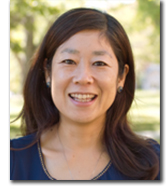
- assistant professor of Japanese in the Department of German, Russian, Asian, and Middle Eastern Languages & Cultures (GRAMELAC)
- from Hiroshima, Japan
- teaches Japanese language and civilization classes
- conducts research on women writers in Japanese science fiction
Background
"I'm originally from Japan, but I moved around quite a bit throughout my academic studies. I was always focused on modern Japanese literature, getting my bachelor's degree at a small women's university in Hiroshima, my master's degree in Vancouver, and then my PhD at Washington University in St. Louis. I just completed it last year.
"When I was little, I loved to go to the library a lot and pick different books to read, so I think that's part of why I chose literature. In fact, I actually wanted to study English literature, but the Japanese university system is different from here. First you have to take an entrance exam, and I was admitted to the Japanese literature department, so that's what I began studying.
"Before coming to Miami last year, I had just finished my PhD dissertation about gender representations within Japanese women's science fiction. It took me a while to finish it, but I'm looking forward to eventually turning it into a book. That is the process I'm in right now.
"Being new to Miami and Ohio, there have been a lot of things to adjust to. Overall, though, I am happy. The students are very nice and interesting, and many of them work really hard!"
Teaching
"I teach a lot of first-year Japanese language classes, and this past spring I taught Introduction to Japanese Civilization [JPN 260 C]. My students show a lot of interest in Japanese culture and literature, even the ones who are not majors and minors in our department.
"The best thing about teaching is getting new ideas from my students. For example, in my Japanese civilization course, many of them were interested in manga, anime, and videogames. I'm especially interested in science fiction, but I don't know a lot about the newer stuff. Therefore, I was able to learn about new anime and fan fiction from my students. I also got to see how they relate themselves to Japanese culture through manga and anime. They gave me a really interesting and different perspective.
"I have different teaching philosophies for my language and literature classes. For my language class, communication is key—that's what language is for! It's performance-based, so my goal is to get my students to produce it effectively and be able to communicate with a native speaker. In class, I don’t really slow down when I speak Japanese; the students have to catch up and adjust. I try to give them dialogue in specific situations, such as buying groceries or ordering food in a restaurant.
"For my other classes, communication is important as well, but I try to create a more comfortable class environment. Students are free to talk about what they are thinking. Some of our topics are culturally sensitive, so they need to feel comfortable enough in the classroom to discuss them openly."
Research
"My research is all based on Japanese literature, and right now I'm focused on Japanese science fiction by women writers. When you think about science fiction, it is often a very male-oriented genre, so I want to bring more attention to women writers. In particular, their works bring up a lot of issues about gender and social roles.
"The GRAMELAC department doesn't have a graduate program, but we do have independent study. This summer I'm working with a student doing a research project, and in the future I hope to get them more involved in some of my own research interests."
Outside the Classroom
"I've been doing long distance running for about ten years. I've completed several marathons and half marathons, and there is a lot of training that goes into that. Running motivates me to keep going. I really enjoy being outside instead of always sitting at a desk. It gives me time to relax and enjoy some peace and quiet.
"I also meditate, which is something I picked up from my parents and brother. Miami has a benefits and wellness program called 'Mindfulness Meditation' every week, which also helps me to relax. I see a lot of faculty, staff, and students there, so it's another great way to interact!"
[June 2016]
 Miami University Oxford, Ohio est. 1809
College of Arts and Science
Miami University Oxford, Ohio est. 1809
College of Arts and Science
 Miami University Oxford, Ohio est. 1809
College of Arts and Science
Miami University Oxford, Ohio est. 1809
College of Arts and Science